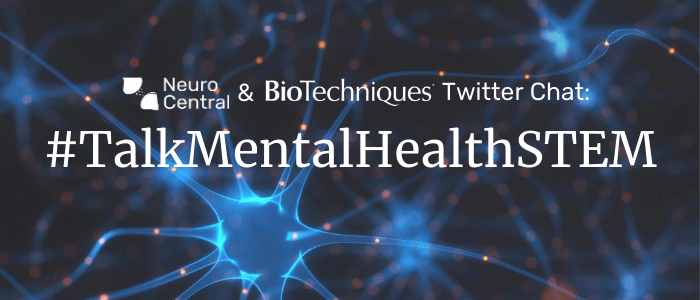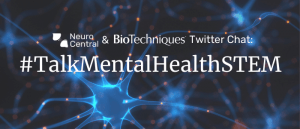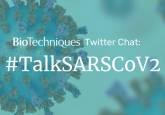#TalkMentalHealthSTEM round up

Raising awareness of mental health in academia, a multidisciplinary panel of scientists took to Twitter with BioTechniques and Neuro Central, to discuss key issues, provide advice and honor World Mental Health Day 2020. Here’s the round up in case you missed it.
On Friday 9 October 2020, BioTechniques and Neuro Central took to Twitter alongside panelists Fay Lin, Dani Beck, Nathasia Mudiwa Muwanigwa, Nii Addy and Jack Gilbert to #TalkMentalHealthSTEM.
 Mental health in academia – a Twitter discussion
Mental health in academia – a Twitter discussion
Find out more about the panelists, their backgrounds and motivations.
Check out our highlights from the discussion below
-
- How are you all today? Can you all tell us about yourselves?
- What are the main issues affecting mental health in academia?
- What are the best things to do if you think someone is struggling with their mental health?
- How can we have more open and honest conversations surrounding mental health?
- What should institutions, lab heads, lecturers etc. be doing to support mental health?
- How has the pandemic highlighted mental health problems, and what can we take from this?
- Have you witnessed a change in perspectives towards mental health during your time in academia?
- What are the pressures with studying for a PhD and how can these be effectively alleviated?
How are you all today? Can you all tell us about yourselves?
My name is Fay and I’m a PhD candidate in Biochemistry @UCLA. In addition to research, I’m a HUGE mental health advocate in academia.
Excited to chat with you all about how we can maintain our mental health during this pandemic.#TalkMentalHealthSTEM https://t.co/lnak4lG4QE
— Fay Lin (@xiaofei_lin) October 9, 2020
I’m doing as well as can be expected, amidst societal challenges of COVID-19 & racial injustices. I’m also encouraged & thankful for #worldmentalhealthday to focus on mental health in society, & also importantly in academia (2/2) #TalkMentalHealthSTEM
— Dr. Nii (@DrNiiAddy) October 9, 2020
I’m doing pretty well ! I’ve recently been really busy, which often means I forget to prioritize self care. I’m learning that no matter how busy I am I always need to set aside even just 10-15 minutes where I meditate or journal and this hels me find some calm in the chaos (2/2)
— Nathasia Mudiwa ???? (@Tasia1409) October 9, 2020
Helloooooo ???? Doing great over here in Oslo, Norway.
Looking forward to answering as many questions as I can! #TalkMentalHealthSTEM #AcademicChatter https://t.co/2LWQmmq4hE
— Dani Beck (@_DaniBeck) October 9, 2020
Hi I am a Professor of Pediatrics and Oceanography @UCSDHealth I am passionate about developing and employing better ways to support mental health issues in academia and beyond #TalkMentalHealthSTEM! https://t.co/YiDe3toEIw
— Jack A Gilbert (@gilbertjacka) October 9, 2020
What are the main issues affecting mental health in academia?
The main issue is the structure of academia itself.
Sure, we need to have access to as much help as possible – but we should also attack the root of the problem and improve the system itself so that it is one that reduces chances of struggling.#TalkMentalHealthSTEM https://t.co/bRQVc4B8nA
— Dani Beck (@_DaniBeck) October 9, 2020
To truly support mental health in academia, we need to focus on systemic change rather than “fixing” the people struggling. 2/2#TalkMentalHealthSTEM
— Fay Lin (@xiaofei_lin) October 9, 2020
I honestly believe that is an ecosystem of ‘well I had to go through hell, so you should too’ in academia. I see so many senior professors trying to breakdown their students rather than build them up #TalkMentalHealthSTEM https://t.co/JUIT7MoEsh
— Jack A Gilbert (@gilbertjacka) October 9, 2020
What are the best things to do if you think someone is struggling with their mental health?
My list (cont.):
– Remind them that struggling with mental health is NORMAL
– Suggest actions items that you can do to support (ex. help with groceries, be available for calls, etc.)
– Respectfully communicate your boundaries in your ability to support 2/2#TalkMentalHealthSTEM— Fay Lin (@xiaofei_lin) October 9, 2020
A3: As a PI, understand the support systems that are available in your university, and understand what you can and cannot do to support someone, and then have an honest discussion with the individual. Try to be compassionate and professional (it’s possible!) #TalkMentalHealthSTEM https://t.co/wRMHHraXqi
— Jack A Gilbert (@gilbertjacka) October 9, 2020
A3: Don’t be afraid to check in with each other. Be willing to listen with empathy, to be a source of support, and willing to point them towards helpful mental health resources. #TalkMentalHealthSTEM https://t.co/c2e7Ay6MGl
— Dr. Nii (@DrNiiAddy) October 9, 2020
… I appreciated that I had friends who just let me vent and didn’t try to diagnose me or minimize my experience. Let them share as much or as little as they are comfortable with. If they ask for your help, do your research on what could be helpful … (2/n)
— Nathasia Mudiwa ???? (@Tasia1409) October 9, 2020
A3: Start by listening to them. Make sure they don’t feel alone (because they are not), and remind them that struggling with mental health is something nearly everyone does at some point in their life.#TalkMentalHealthSTEM https://t.co/K7WbenyTZp
— Dani Beck (@_DaniBeck) October 9, 2020
How can we have more honest and open conversations surrounding mental health?
Given academia’s large power dynamics, it would be extremely impactful for people of power to engage in mental health awareness to further normalize that you can struggle with mental health AND be successful professionally. 2/2#TalkMentalHealthSTEM
— Fay Lin (@xiaofei_lin) October 9, 2020
Secondly, we need to be open and honest about the statistics. The percentage of those experiencing mental health issues is over 40% of the population in the academic environment. This is staggering. #TalkMentalHealthSTEM (2/2)
— Dani Beck (@_DaniBeck) October 9, 2020
I think whats also important is to start to have these conversations within our immediate environments – with our friends, partners, family members, colleagues if possible. Many of us don’t really check in with people around us, even if we love and care for them. 2/2
— Nathasia Mudiwa ???? (@Tasia1409) October 9, 2020
A4: To have more honest conversations, we need to normalize those conversations. Have an active, preemptive discussion/lecture about the issues in your lab meeting. Ensure that everyone is aware that what they may be going through is not taboo! #TalkMentalHealthSTEM https://t.co/A4gsOXyCKc
— Jack A Gilbert (@gilbertjacka) October 9, 2020
What should institutions, lab heads, lecturers etc. be doing to support mental health?
A5: Our code of conduct is here https://t.co/PDwRsbn043 – and our flat, matrix management program means that everyone has multiple people as mentors, because everyone may feel more comfortable talking to certain people #TalkMentalHealthSTEM https://t.co/zbGwj58sMa
— Jack A Gilbert (@gilbertjacka) October 9, 2020
A5: We should clearly state, in words & actions, that mental health challenges are real, valid & require our attention. Acknowledging mental health challenges is something to be applauded, not dismissed. We need to create spaces of support, empathy & care #TalkMentalHealthSTEM https://t.co/C9uOIdejdm
— Dr. Nii (@DrNiiAddy) October 9, 2020
How has the pandemic highlighted mental health problems, and what can we take from this?
My struggles may be different from the struggles of others.
We must take the time to listen to everyone’s story, as the pandemic impacts everyone differently due to varying privilege. 2/2 #TalkMentalHealthSTEM
— Fay Lin (@xiaofei_lin) October 9, 2020
…When I finally sat down with my thoughts, I found myself unbelievably burnt out and overwhelmed, stressed, frustrated and in panic mode. My takeaway from being in lockdown is it is important to constantly check in with myself… (3/n)
— Nathasia Mudiwa ???? (@Tasia1409) October 9, 2020
A6: The pandemic has normalized the anxiety we can all feel during uncertain times. In many ways, it’s also exacerbated challenges for those already struggling with mental health challenges. It’s also highlighted the importance of community & connectedness. #TalkMentalHealthSTEM https://t.co/tqdeZIi8gV
— Dr. Nii (@DrNiiAddy) October 9, 2020
There are some individuals reporting experiencing mental health issues for the first time during this pandemic – of course this is due to various reasons, e.g. isolation, reduction in social life, and increased loneliness, and more.
(2/2)#TalkMentalHealthSTEM— Dani Beck (@_DaniBeck) October 9, 2020
A6: Covid19 and the lockdown have led to isolation and introspection for many, that I believe is causing some issues. However, interestingly others are doing better due to a reduction in the pressure to be ‘seen’ in the lab, etc. #TALKmentalhealthSTEM https://t.co/MGfz01bIH9
— Jack A Gilbert (@gilbertjacka) October 9, 2020
Have you witnessed a change in perspective towards mental health during your time in academia?
INITIATING open dialogue helped me realize that I was not alone in my struggle.
Do I still receive stigmatizing remarks? Yes. However, I have also built a HUGE support network that helps me navigate being a system not built for me. 2/
#TalkMentalHealthSTEM— Fay Lin (@xiaofei_lin) October 9, 2020
A7: I can’t say I know how things were like many years ago. But my impression is that with the age of social media, more of us are speaking up. More are coming out to say “I have ***, and it’s okay”.
This inspiring self-advocacy has been contagious.#TalkMentalHealthSTEM https://t.co/rQRfNucAUf
— Dani Beck (@_DaniBeck) October 9, 2020
A7: I can honestly say I am not sure. As I have evolved in my career, I have been through many different organizations and they each handled it differently. However, I have become more and more aware of the problem, which has challenged me to find solutions #TALKmentalhealthSTEM https://t.co/wxSXQFtMaJ
— Jack A Gilbert (@gilbertjacka) October 9, 2020
A7: I’ve seen a decrease of stigma around mental health conversations, especially amongst students. There’s an increased willingness to see mental health support & care. #TalkMentalHealthSTEM https://t.co/JC9ixYOu4z
— Dr. Nii (@DrNiiAddy) October 9, 2020
What are the pressures with studying for a PhD and how can these be effectively alleviated?
We also need to improve collaborative effort in our science, where more people help with producing one paper.
This has shown to improve the research we do, but as a PhD student, this also takes the pressure off + helps with the time aspect of how long things take.
— Dani Beck (@_DaniBeck) October 9, 2020
How to alleviate this is a difficult question for me to answer. However, I think it is important that you realize that you are more than your productivity, and try and avoid tying your self worth to the amount of work you produce (2/2)
— Nathasia Mudiwa ???? (@Tasia1409) October 9, 2020
A8: The central pressure if fear of failure, but if we can create environments where people do not fear failure, but embrace it as a central part of learning, it will alleviate much of the stress #TALKmentalhealthSTEM https://t.co/nwnJYsCCNh
— Jack A Gilbert (@gilbertjacka) October 9, 2020
Found this content useful? Keep up with more like this by following BioTechniques on Twitter.





